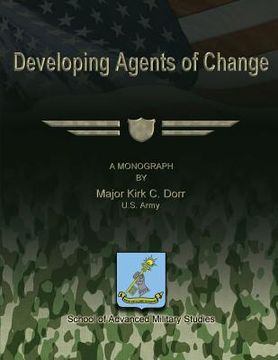Share
Developing Agents of Change
U. S. Army Major Kirk C. Dorr
(Author)
·
School Of Advanced Military Studies
(Contributions by)
·
Createspace Independent Publishing Platform
· Paperback
Developing Agents of Change - Studies, School Of Advanced Military ; Dorr, U. S. Army Major Kirk C.
Choose the list to add your product or create one New List
✓ Product added successfully to the Wishlist.
Go to My Wishlists
Origin: U.S.A.
(Import costs included in the price)
It will be shipped from our warehouse between
Friday, August 09 and
Friday, August 16.
You will receive it anywhere in United Kingdom between 1 and 3 business days after shipment.
Synopsis "Developing Agents of Change"
The Army in the early 1980's experienced a flourish of intellectual growth actuated by the negative experiences of many of its young officers during the Vietnam War and their dissatisfaction with the standards in professional military education. The focus of the Army at the time was planning and training the force to counter the Cold War military threat of the Warsaw Pact. An environment of increasing complexity was evolving as concurrent efforts to improve recruiting, reform training and doctrine, and field a new generation of major weapon systems forced Army leaders to seek better ways to bring all of these advancements together. In 1981, then Lieutenant Colonel Huba Wass de Czege published an article critical of the conventional military education approach of mid-career Army field grade officers. This was the genesis for the formation of the School of Advanced Military Studies (SAMS). By conceptual design SAMS would provide a broad military education in the science and art of war at the tactical and operational levels beyond the Command and General Staff College (CGSC) course curriculum in terms of theoretical depth and application. SAMS officially began in 1984 at Fort Leavenworth as a rigorous, yearlong course of study following attendance at CGSC. The purpose of SAMS, the curriculum, selection process, and post-SAMS assignment policies remain relatively unchanged since its inception. What has continued to evolve throughout the school's tenure is the accelerated rate of change in service missions, technology, and battlefield conditions graduates must deal with upon arrival in the field. SAMS was designed for talented officers to develop a common cultural perspective on problem solving and war fighting that would facilitate the rapid adaptation to these types of realities. This monograph discusses the challenges of maintaining the Army's effectiveness through the process of change. As conditions of warfare change, the methods and techniques of our doctrine must evolve with them. Knowing what to change will be more difficult and riskladen as the rapid rate of technology and the relative brevity of future operations across the spectrum of conflict combine to create a situation where the consequences of peacetime choices become irretrievable in war. This study addresses the role of professional military education in creating cultural change within the military. This paper examines the model of the Prussian, later German Kriegsakademie, to demonstrate how modern military organizations can be effective in shaping culture to attain high performance on the battlefield. The implementation of SAMS reflected weaknesses in the Army culture and the educational institutions that sustained it. The Army Officer Education System (OES) is now adapting to meet the emerging requirements of full spectrum operations and the transforming Army. On the eve of its twentieth anniversary, SAMS should also conduct a review of its systems and practices to ensure the year of expanded study meets the demands of the Army, the joint environment, and its students. A review of SAMS can ensure the maintenance of the highest standards and the programs adherence to the spirit and mission for which it was created. The tendency of an overburdened American military emphasizes action, not thoughtful reflection; yet never was thinking more necessary. The infusion of the Army with officers from SAMS with a common cultural base with similar mental references serves as a collective that can institutionalize military excellence and cope with complex problems at an educated level. The self-regenerating nature of SAMS removes any reliance upon the appearance of one or more military geniuses in the force because it consistently produces outstanding, competent officers. Over time, the common cultural bias established through advanced education can affect changes in service culture.
- 0% (0)
- 0% (0)
- 0% (0)
- 0% (0)
- 0% (0)
All books in our catalog are Original.
The book is written in English.
The binding of this edition is Paperback.
✓ Producto agregado correctamente al carro, Ir a Pagar.

